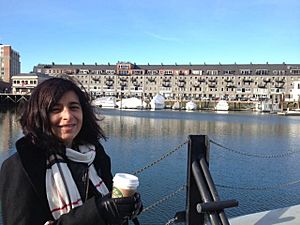Valeria de Paiva facts for kids
Quick facts for kids
Valeria de Paiva
|
|
|---|---|
 |
|
| Born |
Valeria Correa Vaz de Paiva
|
| Alma mater | University of Cambridge (PhD) |
| Scientific career | |
| Fields |
|
| Institutions | PARC Nuance Communications University of Birmingham |
| Thesis | The Dialectica Categories (1988) |
| Doctoral advisor | Martin Hyland |
Valeria Correa Vaz de Paiva is a smart Brazilian scientist. She is a mathematician, which means she studies numbers and shapes. She is also a logician, someone who studies how we reason and think correctly. And she is a computer scientist, who works with computers and how they solve problems.
Valeria's work helps us understand how computers think and process information. She uses special math tools, like category theory, to explore how computers work. She also studies how we can teach computers to understand human language.
Contents
Valeria's School Journey
Valeria de Paiva loved learning about math from a young age. In 1982, she earned her first degree in mathematics. Two years later, in 1984, she completed her master's degree. This degree focused on a type of math called abstract algebra.
Studying at Cambridge University
Valeria then went to the University of Cambridge in England for her advanced studies. She earned her PhD, which is a very high degree, in 1988. Her teacher there was a famous mathematician named Martin Hyland.
For her PhD, Valeria wrote a special paper called a thesis. In her thesis, she created something new called "Dialectica spaces." These spaces are a way to use category theory to build models for a type of logic called "linear logic." This idea was inspired by the work of another famous mathematician, Kurt Gödel.
Her Amazing Career
After finishing her studies, Valeria de Paiva worked at several interesting places.
Working at PARC
She spent nine years working at PARC. This is a famous research center in Palo Alto, California. Many important computer ideas came from PARC.
Other Companies and Research
Valeria also worked at companies like Rearden Commerce and Cuil. Later, she joined Nuance Communications. Nuance is a company that works on speech recognition and understanding human language.
Today, Valeria is an honorary research fellow in computer science. She works at the University of Birmingham in England. This means she helps with research there. She is also part of an important group called the Division for Logic, Methodology and Philosophy of Science and Technology. This group helps guide how we study logic and science around the world.
Important Papers and Books
Valeria has written many important papers and contributed to books. Here are a few examples:
- Applied Category Theory in Chemistry, Computing, and Social Networks. This paper, written with other scientists, talks about how category theory can be used in many different areas. It was published in 2022.
- Term Assignment for Intuitionistic Linear Logic. This paper was written with her colleagues in 1992. It explores how to assign terms in a specific type of logic.
- Lineales. This paper, written with her former teacher J.M.E. Hyland, was published in 1991.
- A Dialectica-like Model of Linear Logic. This paper from 1989 explains her ideas about "Dialectica-like models" for linear logic.
- The Dialectica Categories. This paper from 1989 is about the "Dialectica Categories" she developed during her PhD studies.
See also
 In Spanish: Valeria de Paiva para niños
In Spanish: Valeria de Paiva para niños

